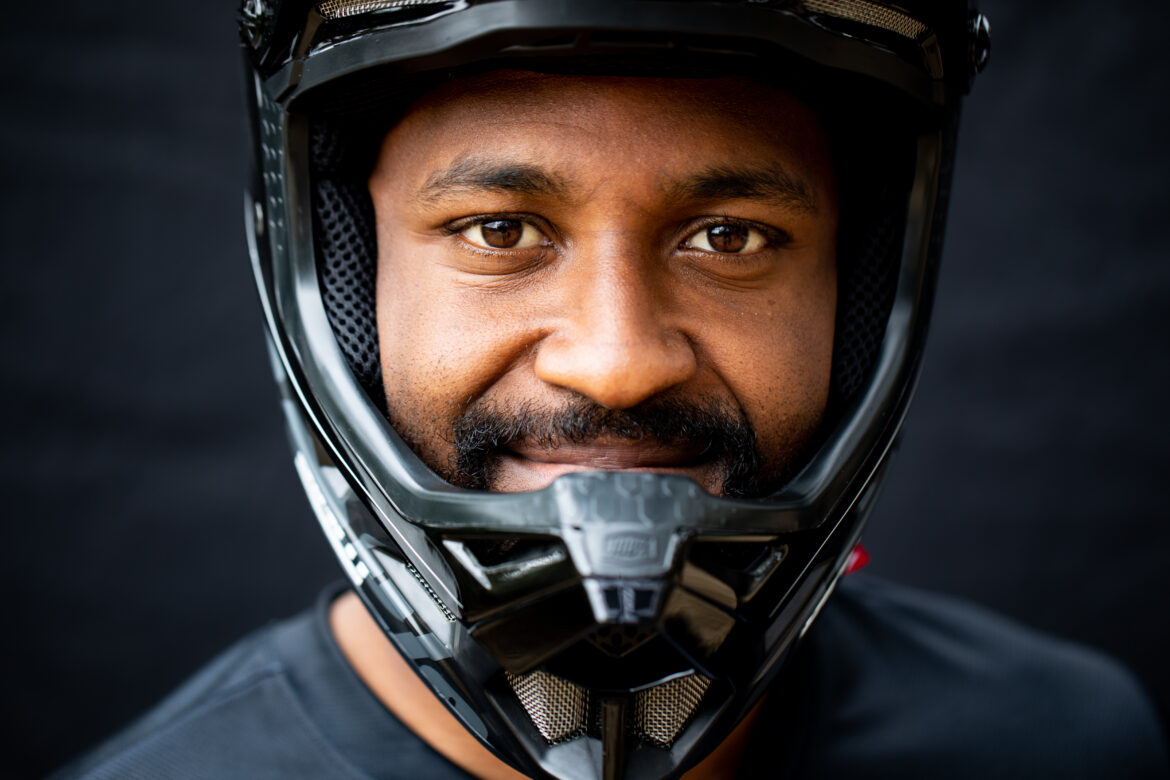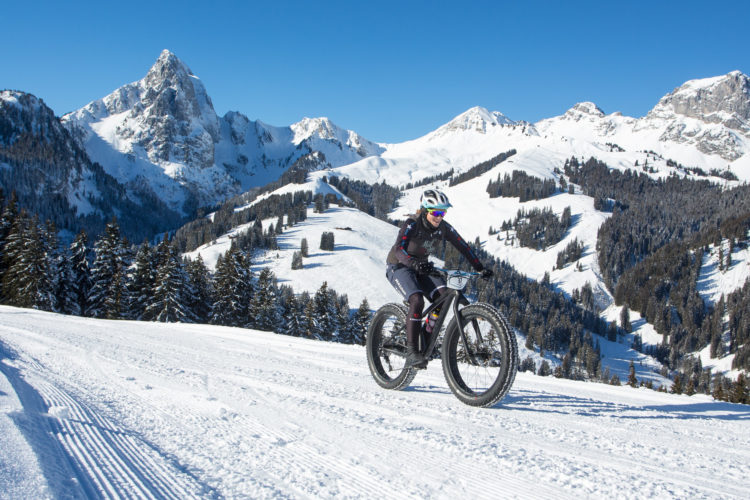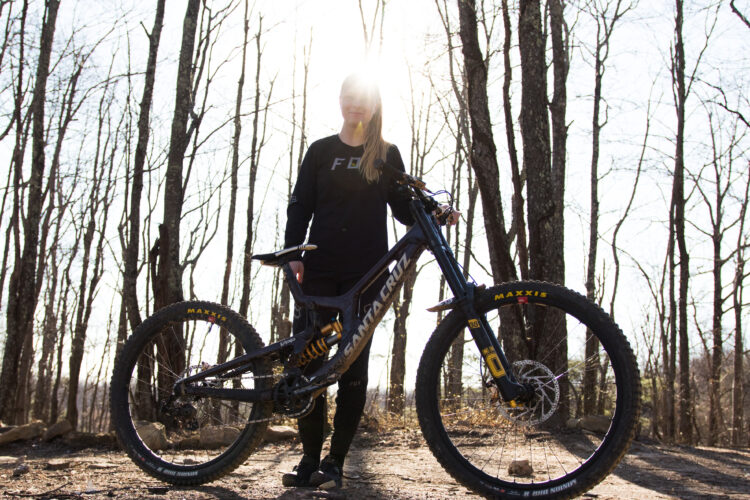
On June 2nd, former downhill World Cup racer and Red Bull presenter Eliot Jackson took to social media to lament the cycling community’s reaction to the George Floyd protests. The video soon received over 100,000 views, hundreds of comments, and countless media inquiries.
Two months later he announced the launch of his cycling foundation —Grow Cycling Foundation— to “promote education, access and opportunities that increase diversity and inclusion in cycling.”
Jackson sat down with Singletracks to talk about Grow Cycling Foundation and stepping into an advocacy role he never sought out.
Like everyone else, Eliot Jackson has had an unusual 2020 season. The mountain biker and Red Bull presenter made it to Crankworx New Zealand in early March, but returned to his home in Thousand Oaks, California, only in time for the lockdown to start. For the first time in 10 years, Jackson has been at home for the spring and early summer months, but one can hardly call it down-time.
Jackson has been keeping busy programming, playing music, riding, as well as some entrepreneurial projects, the latest of which went public in July when he, together with downhill rider Katie Holden and businesswoman Joi Jackson, announced the launch of the Grow Cycling Foundation.
All the while, Jackson spent some time looking inward, processing the issues that have been present throughout his athletic career. Issues that burst to the foreground in the wake of George Floyd’s death and the re-invigorated racial justice movement nation-wide.
George Floyd’s death affected Jackson deeply as did the subsequent response from the cycling community, compelling him to take on an advocate role he thus far avoided.
Advocacy Through Circumstance
At age 4, Jackson followed his older brother, Andrew, into motocross. He raced until he was 15, claiming five national championship titles along the way. At 18, he fell in love with downhill mountain biking and set out to make it his career. He lined up at his first World Cup race, at Val di Sole, Italy in 2010.
All the while, in both motocross and mountain biking, Jackson was always one of, if not the only, Black man on the start line. Yet he never made race his platform. He never intentionally set out to be a trail blazer or clear a path for the next Black rider.
In retrospect, Jackson, now 30, recognizes that the very act of him lining up to race in a predominantly White sport was a minor act of advocacy, but he never looked at it that way.
“I just want it to be the best,” Jackson said. “Motocross is even worse than mountain biking, in that it’s just as White, but it’s often in the South and there’s a lot more conflict, to put it nicely.”
“For sure, I heard a lot of racist stuff. But I was really young and had my family around, and, since there weren’t a lot of Black people, all of my friends too were White. So I just wanted to beat everyone, whatever color they were.”
From there, his transition into mountain bike racing was an easy one.
“I was already comfortable performing in an environment that has no people that look like me,” Jackson explained.
“And when it came to racing, there simply wasn’t any mindshare to think of that. I had to be strong, not have any weaknesses, and really put everything that wasn’t racing out of my head. I never explored me having any kind of disadvantage because my only job was to win a race.”
But that changed in May, when George Floyd was killed and protests against racial injustice and police brutality gripped the nation.
“It was kind of a perfect storm of not racing full time, having more mindshare to think about everything, and then the George Floyd protests which really affected me a lot,” said Jackson.
“I spent some time going internal and reckoning with and reconciling all of these things that I felt over the years.”
And then, frustrated and ashamed by the cycling community’s inaction and lack of empathy, Jackson uncharacteristically took to social media to talk about race.

Time for Action
In an 11-minute Instagram video, Jackson set out to put an end to the cycling community’s false portrayal of inclusivity and worse, the common conception that there is no racism in cycling or that people ‘don’t see color, just riders.’
“We built this identity around being inclusive and then something bad happens, and you say nothing. Like, you’re willing to fight for my trails but not for my right to live? I have and still deal with racism on a daily or weekly basis and people will continue to tell me it doesn’t exist,” said Jackson.
The video was a way to educate the community on how the continued ignorance or mindsets around race within cycling are offensive to people of color. To date, the video has received more than 100,000 views, hundreds of comments and plenty of media inquiries (most of which Jackson declined).
But slapping a picture of a Black person on your branding is nothing but cheap virtue, he warned.
“For a brand, it really comes down to why do I want them here? My mom and I talked about Vogue a lot, and this idea of cheap virtue. As in, what is the cheapest thing I can do as a brand to seem virtuous? And so you see Black women in these magazines now and yet it’s no easier to become a Black supermodel than it was yesterday,” Jackson said.
“And does the brand even know how to tell Black or people of color stories? There’s a difference between telling diverse stories and using diversity to tell a brand story. So if you’re putting Black women in the magazine, but at the same time you’re making them straighten their hair and all this stuff, is it really diverse?”
Jackson recognizes that representation, however self-serving, is indeed a start. He himself rarely saw people of color represented in the magazines he leafed through as a kid. And he does think the uptake in diverse faces and voices of the recent months will continue and maybe become the norm.
“I laugh with my friends that being Black catapulted me to influencer status because recently I have all these companies and media reaching out to me,” Jackson said.
“But I have only one story to tell, only one source of truth. I don’t speak for all Black people, we’re not a monolith. So for me, I don’t need that opportunity right now, but I do want it to go to the next Black mountain biker or the next person of color because there are people out there, most people just don’t know about them yet.”
The Grow Cycling Foundation
Instead of telling stories in the spotlight, Jackson prefers his role behind the scenes and creating things, whether it’s a piece of code, a startup, or connections.
“I always had a thing of like, ‘I’m not an activist, I’m an athlete,’ and I still think that but I also think that we can all be activists. My activism, my role, is trying to put in place an infrastructure through which people can bypass some of the barriers that have kept so many people of color out of cycling.”
After nearly three decades of riding bikes (motorized and human-powered) competitively, and enjoying the many unique opportunities that have come with it, Jackson wants to pay it forward.
Which is what the Grow Cycling Foundation is all about.
Through the pillars of Education, Opportunity, Community, and Access, the foundation aims to create new avenues for inclusive community building and career development in the cycling industry as well as empower existing programs working to tear down the barriers to entry in cycling for marginalized communities.
At the center of it all is a pumptrack, which will serve as a community space, a venue, and the gateway to connections, education, and career opportunities.
The pumptrack will be built in Los Angeles with the goal of being the host venue for the 2022 Pumptrack World Championships. It will also serve as a space for the local community of color, to host events and introduce new people to the sport of cycling while providing a venue for education and opportunities in the cycling industry.
“We plan to partner with existing organizations to provide bikes. And with those bikes, let’s teach kids how to mechanic and once you taught them how to mechanic, provide a path to getting a mechanic job at SRAM. Likewise, if we’re going to host a world championship, somebody has to market that, so then what would it look like to use that community to do the marketing for the event and then open the doors to a social media job at Red Bull,” Jackson explained.
“The life that cycling has given me, the travel, the opportunities, doesn’t exist for most people who look like me. And I want to provide people with the same life that I have been able to live.”




















1 Comments
Sep 10, 2020
I look forward to seeing all of the rad stuff this group of folks can do through the Grow Cycling Foundation.